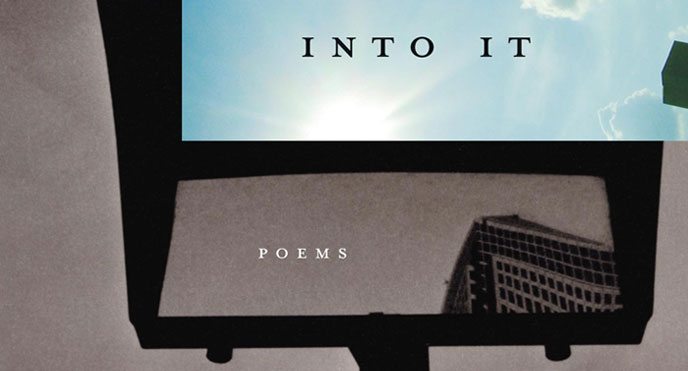Lawrence Joseph
Named after the great work by Persian poet, astronomer, philosopher and Omar Khayyam, Lawrence Joseph’s “Rubaiyat” is nothing less than a contemporary cosmology for the Forever War. Where are the heavens when satellites clog them, looking for bomb targets? What is order, when the rationale of modern states is schizophrenic? Slipping through these questions moves a great, and intimate intelligence. Grabbing images, sorting out the insane facts of war—a soldier who puts a condom on his gun to keep the sand out. The translator in a war zone wearing a bullet proof vest. The armies making home movies of their tours of duty. Like they were at a wedding. The voice sounds like that of a man thinking aloud in a confessional. Or as Joseph puts it, he writes with “a speed, of lament, a threnody. / A poem of thoughts, of consequences.” On the war goes, and no one in American poetry measures its costs quite like Joseph.
—John Freeman
Rubaiyat
The holes burned in the night.
Holes you can look through and see
the stump of a leg, a bloody
bandage, flies on the gauze; a pulled-up
satellite image of a major
military target, a 3-D journey
into a landscape of hills and valleys . . .
All of it from real-world data.
Zoom in close enough—the shadows
of statues, the swimming pools of palaces . . .
closer—a garden of palm trees,
oranges and lemons, chickens, sheep;
a map being sketched on a scrap
of paper; a fist coming down firmly
on the table; a tray with a dish
of lamb, and a bowl of rice and pine nuts.
Yes, that’s it. I’ve become
too clear-sighted—the mechanics of power
are too transparent. Yes, that’s
precisely it. The creation
of a deep-down pit, a slag heap
of broken masonry, of twisted metal,
a persistent ringing noise from inside—
as if thousands of telephones have been
left off the hook. Did you notice that?
The Pentagon’s “Military Diaries
Project,” soldiers starring in their own
war movies, training digital cameras
on themselves—a child is put
in a wheelbarrow after stepping on a mine.
Politics? Personified. His head
permanently cocked, he is attended
by a team of physicians
and an electronic-implant engineer.
He hopes he’ll be able to confer
with the Shah of Iran in Cairo. “Dead?
The Shah? Really? No one’s said a thing
to me about it,” his response to the response
of a diplomatic press correspondent.
Poetry’s not what’s made impossible
by it—laughter is. Is it even
farce?—the translator, for example, who,
because of threats, is wearing a bulletproof
vest and a large pair of army goggles
for disguise, the sniper who slides
a condom over the muzzle of his gun
to keep the sand out. I try to get
the chronology straight . . . I look
out on the harbor, in the blue light.
I type into my machine. Perhaps
a glance at the newspaper. I listen
closely and I don’t listen at all . . .
How complicated do you think the geopolitical
background behind all of this is? Brains
uprooted and warped, the logic’s
schizophrenic. What’s that again? A poem,
a speech, of lament, a threnody.
A poem of thoughts, of consequences.
Time flows, is flowing, forward and back.
I lift a spoon, my hand is trembling. How many
corpses are counted and for what reasons?
That’s what was said. The captured are blinded
except one blinded in one eye only
will lead the others back. What? War
as a living text? Cyberwar and permanent
war, Third Wave War, neocortical war,
Sixth Generation War, Fourth Epoch
War, pure war and war of computers
to process it, systems
to represent it, war of myth
and metaphor, of trope and assent,
war of hundreds of millions of televisions
assuring it, hundreds of billions
of dollars, a PK machine gun or two, a few
gunmen you can hire cheap, with their own
Kalashnikovs. Now . . . what now?
I want you to watch carefully
what I am saying now—are you
with me? An inch-long piece of steel,
part of the artillery shell’s
casing, sliced through the right eye
into his brain, severely damaging
the optic nerve of his left eye,
spraying bone splinters
into the brain, making him quick to lose
his temper, so acutely sensitive to pain
the skin on his face hurts
when wind blows against it . . .
Lawrence Joseph is the author of Codes, Precepts, Biases, and Taboos: Poems 1973-1993; Lawyerland; Into It; and Before Our Eyes. He lives in downtown Manhattan and is a professor of law at St. John’s University School of Law.
John Freeman is an award-winning writer and book critic. The former editor of Granta and onetime president of the National Book Critics Circle, he has written about books for more than two hundred publications worldwide, including The New York Times Book Review, the Los Angeles Times, the San Francisco Chronicle, The Wall Street Journal, The Guardian, La Repubblica, and La Vanguardia. His first book, The Tyranny of E-mail, was published in 2009. His poetry has been published in The New Yorker, ZYZZYVA, and The Paris Review. He lives in New York City.

